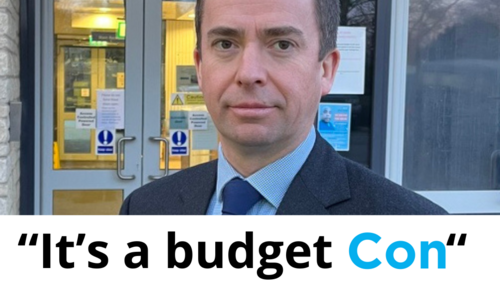Hunt’s budget deception fails to cover up Tory failures

Commenting on today’s Budget, Calum Miller, Liberal Democrat Parliamentary Candidate for Bicester and Woodstock and County Councillor for Otmoor, said:
“Today's sticking plaster Budget fails to cover deep wounds in the NHS and many public services. Residents in Bicester and Woodstock will still pay more for food, housing and in tax.
People won’t be fooled by the deception of a Chancellor who claims to be cutting tax when everyone knows taxes have gone up by stealth and will hit a new high by 2028-29. By freezing personal allowances, Hunt will get almost two pounds more in income tax for every pound he claims to give back in National Insurance.
We can all see that public services are in crisis with rising costs and growing demand. Tory mismanagement of the economy means budgets for many services will fall by 2.3 per cent each year from 2025-6. At the same time, debt will rise to a historic high with more spent on debt interest payments.
Jeremy Hunt has served in the Tory Cabinet for five and a half years since 2015. He owns these failures, alongside the rest of this clapped-out government. We need a General Election now."
To find out more about Calum Miller PPC for Bicester and Woodstock click here
Background information:
- The OBR forecasts a 2.3 per cent cut each year from 2025-6 to the budgets of many departments, including local government (including adults and children’s social care), the Home Office (police and security), justice (courts and prisons) and transport. (1)
- The OBR states public sector net borrowing will peak at 93.2 per cent of GDP in 2027-8 (2). In that year, government expenditure on debt interest will be 3.3 per cent of GDP (3).
- Cumulative inflation has been 21 per cent since 2020. Interest rates have risen over this period by 5.15 percentage points. (4)
- The OBR states that the tax take as a proportion of the economy will rise to 37.1 per cent of GDP in 2028-9 and that increases in income tax of 1.3 per cent of GDP since 2020 outstrip the reductions in National Insurance contributions announced over the last two fiscal events (0.7 per cent of GDP). (5)
- Jeremy Hunt has served as Secretary of State for Health from 7 May 2015 to 9 July 2018, as Foreign Secretary from 9 July 2018 to 24 July 2019 and as Chancellor of the Exchequer from 14 October 2022 to today. That is 5 years, 7 months and 7 days.
- (1) OBR ‘Economic and Fiscal Outlook’, published today (6 March 2024; obr.uk) report para 1.29 “…a real cut in all other departments’ budgets of 2.3 per cent a year from 2025-26”
- (2) OBR ‘Economic and Fiscal Outlook’, published today (6 March 2024; obr.uk) report para 1.24 “Public sector net debt (excluding the Bank of England) in the central forecast rises from 88.8 per cent of GDP this year to a peak of 93.2 per cent of GDP in 2027-28…”
- (3) OBR ‘Economic and Fiscal Outlook’, published today (6 March 2024; obr.uk) report Table 4.5
- (4) Bank of England inflation calculator here/ base rate here.
- (5) OBR ‘economic and Fiscal Outlook’, published today (6 March 2024; obr.uk) report para 1.21 “Tax as a share of GDP is forecast to rise to 37.1 per cent of GDP in 2028-29, 4.0 per cent of GDP higher than the pre-pandemic level … Over the whole period, major tax-raising policy decisions since March 2020 raise the tax take by 2.0 per cent of GDP, of which the freezes to income tax thresholds account for 1.3 per cent of GDP. These are partially offset by major tax cuts amounting to 0.9 per cent of GDP, of which the cuts to NICs announced in this Budget and in November 2023 account for 0.7 per cent of GDP.”
